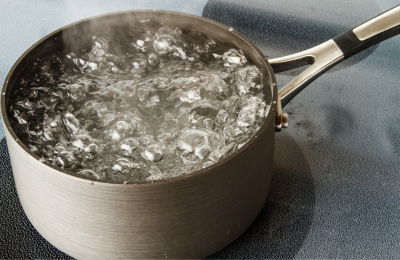Boil Water Notice
Why Would The City Issue A Boil Water Notice (BWN)?
BWNs are instituted by public water systems (PWSs) as specified by Title 30 Texas Administrative Code (TAC) §290.46(q) in the event of:
- Microbiological samples found to contain E. coli,
- Failure to maintain adequate disinfectant residuals,
- Elevated finished surface water turbidities, or
- Other conditions which indicate that the potability of the drinking water supply has been compromised.
During the below criteria the City will follow the TCEQ rules for Special Precautions:
- Low distribution pressures (below 20 pounds per square inch (psi)).
- Water outages.
Advisories may include information about preparing food, drinks, or ice; dishwashing; and hygiene, such as brushing teeth and bathing. Boil water advisories usually include this advice:
- Use bottled or boiled water for drinking, and to prepare and cook food.
- If bottled water is not available, bring water to a full rolling boil for 1 minute (at elevations above 6,500 feet, boil for 3 minutes). After boiling, allow the water to cool before use.
- Boil tap water even if it is filtered (for example, by a home water filter or a pitcher that filters water).
- Do not use water from any appliance connected to your water line, such as ice and water from a refrigerator.
Hand-washing, Bathing, and Showering
In many cases, you can use tap water and soap to wash your hands during a boil water advisory. Follow the guidance from your local public health officials. Be sure to scrub your hands with soap and water for at least 20 seconds. Then, rinse them well under running water. If soap and water are not available, use an alcohol-based hand sanitizer that contains at least 60% alcohol. Be careful not to swallow any water when bathing or showering. Use caution when bathing babies and young children. Consider giving them a sponge bath to reduce the chance of them swallowing water.
Brushing teeth
Brush teeth with boiled or bottled water. Do not use tap water that you have not boiled first.
Washing dishes
If possible, use disposable plates, cups, and utensils during a boil water advisory. Household dishwashers generally are safe to use if:
- The water reaches a final rinse temperature of at least 150 degrees Fahrenheit (66°Celsius), or
- The dishwater has a sanitizing cycle.
To wash dishes by hand:
- Wash and rinse the dishes as you normally would using hot water.
- In a separate basin, add 1 teaspoon of unscented household liquid bleach for each gallon of warm water.
- Soak the rinsed dishes in the water for at least one minute.
- Let the dishes air dry completely before using them again.
Laundry
It is safe to wash clothes as usual.
Cleaning
Clean washable toys and surfaces with:
- Bottled water,
- Boiled water, or
- Water that has been disinfected with bleach.
Caring for pets
Pets can get sick from some of the same germs as people or spread germs to people. Give pets bottled water or boiled water that has cooled. If bottled water is not available, bring water to a full rolling boil for 1 minute (at elevations above 6,500 feet, boil for 3 minutes). After boiling, allow the water to cool before use. Boil tap water even if it is filtered (for example, by a home water filter or a pitcher that filters water). Do not use water from any appliance connected to your water line, such as ice and water from a refrigerator.
Caring for your garden and houseplants
You can use tap water for household plants and gardens.

